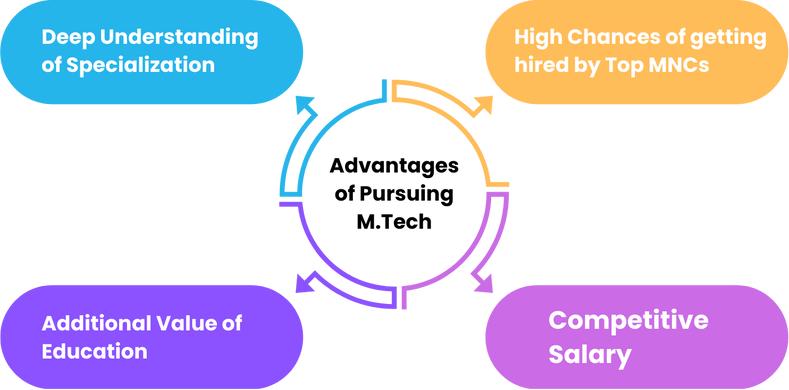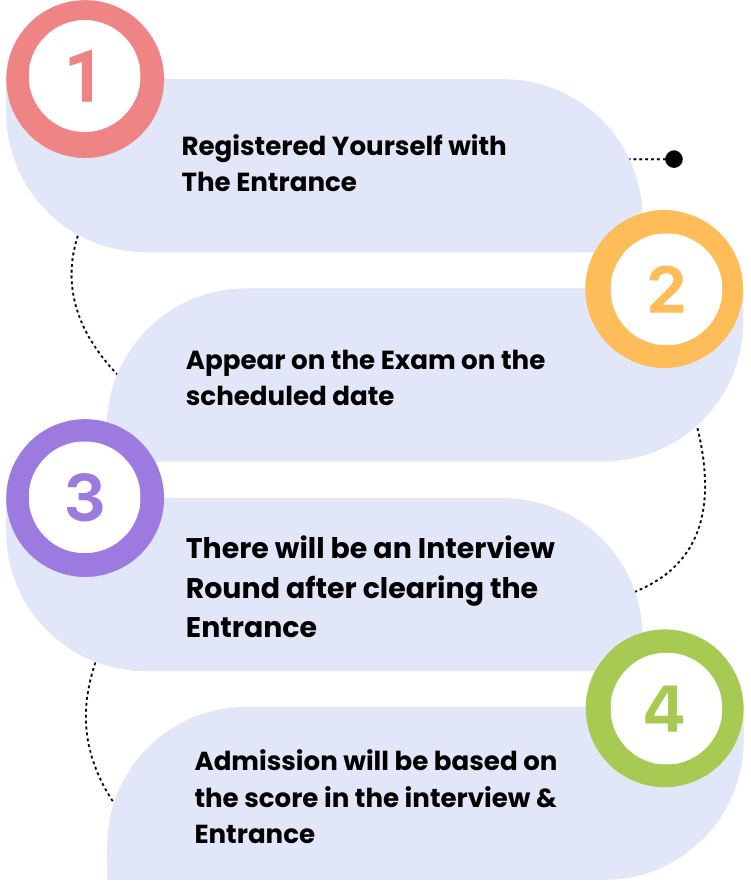What is the full form of M.Tech?
Absolutely! M.Tech, short for Master of Technology, is a popular postgraduate program in the engineering and technology domains. It attracts students who have completed their B.Tech and wish to deepen their knowledge and expertise in specific engineering fields.
M.Tech degrees offer specializations such as computer science, IT, civil engineering, mechanical engineering, automotive engineering, electronics and communications, and more. These programs focus on innovation, research, and the application of advanced technologies.
For B.Tech/BE graduates and working professionals in the engineering field, part-time M.Tech courses are highly recommended. These programs allow students to continue working while pursuing higher studies, offering practical experience alongside academic learning.
It’s important to note that distance M.Tech programs are not recognized by the Supreme Court of India. However, working professionals can opt for part-time M.Tech, M.Tech evening programs, or M.Tech for working professionals, which are valid options to advance their education and career prospects in the engineering field.
Overall, M.Tech is esteemed for its focus on research, technological advancement, and preparing engineers for leadership roles in various industries.
Why should I even pursue M.Tech?
M.Tech is helpful for working professionals who want to add one more degree to the engineering field and for students who are looking to learn more about technology.
 Here is the list of benefits that you will get in the M.Tech course:
Here is the list of benefits that you will get in the M.Tech course:
- M.Tech helps students to dive deep into a particular specialisation and concepts like Chemical Engineering, Thermal Engineering, Power Systems Engineering, and so forth.
- Adds more value to your educational qualifications.
- M.Tech degree can help you get a high-rank job in the engineering field.
- Masters degrees always land students in the highest paying jobs.
UG & PG Programs Details Guide 2024
Course Details Of M.Tech Program – Quick Facts
| Level |
Post-graduation |
| Duration |
2 years (4 semesters) |
| Fee Structure |
INR 50,000- 2,00,000 |
| Minimum Eligibility |
Must be graduate in B. Tech/ BE from a recognized Institute |
| Modes of learning |
Classroom Lectures and hybrid (online+offline) lectures |
| Program Types |
Full-time and Part-time |
| Entrance Exams |
GATEAP PGECET
OJEE
TANCET
BHU PET
UPSEE
M.Tech Entrance Exams |
| Admission Process |
Merit-Based, Entrance Exam |
| Scholarship |
- State government scholarship programs are open to candidates from reserved categories and economically disadvantaged groups.
- Merit scholarships (based on grades in the entrance exam or graduation) are available at deemed or private universities.
|
| Internship |
There are a lot of internship opportunities for M.Tech in India. |
| Starting Salary |
INR 5 to 8 LPA |
| Job Options |
- Senior Engineer
- Project Manager
- Researcher
- Technical consultant
- Technical Scientist
- Account Manager
- Technical Program Leader, etc.
|
| Top Colleges |
Lingaya’s University, Sri Venkateswara University, BITS Pilani, Mewar University, etc. |
The Eligibility Criteria of M.Tech
Many students want to pursue their higher education in the M.Tech program. If you choose to apply for an M.Tech course, you must meet certain eligibility requirements in order to be accepted into the program. M.Tech courses are becoming more common as they help to lift a candidate’s profile in the engineering industry. Candidates are occasionally perplexed by the M.Tech course’s academic requirements. So, we have detailed information about the candidates who are qualified to enroll in an M.Tech program, have a look:
- The candidate must have a bachelor’s degree in BE/B.Tech from a recognized institute.
- The candidates need to clear the entrance exams like GATE and NEET and the admission is based on the score you obtain in your entrance and then in your interview.
Difference Between ME And M.Tech
ME – Master Of Engineering
M.Tech – Master Of Technology
Both these degrees are in the engineering & technological field, however, they still differ from each other. You can take the reference from the table below:
| ME |
M.Tech |
| Full form of ME is Masters of Engineering |
The full form of M.Tech is Masters of Technology. |
| This is a knowledge-oriented program |
M.Tech is designed to focus more on skills |
| ME focuses on more on in-depth facts and theoretical knowledge |
M.Tech emphasizes more on practical exposure. |
| M.E. is mostly offered by self-affiliated colleges or private universities. |
M.Tech. is offered by colleges affiliated with different universities. |
Do I need to give any entrance exam for admission to M.Tech?
Absolutely! For students completing their Bachelor’s in BE or B.Tech and aspiring to pursue M.Tech, admission is typically based on clearing national-level, state-level, or institute-level entrance exams like GATE (Graduate Aptitude Test in Engineering) in India.
However, for working professionals in the engineering field who wish to pursue further education, there’s an option known as M.Tech for Working Professionals (M.Tech WILP). In this program:
1.
Direct Admission: Candidates can secure admission without the need to clear an entrance exam, provided they have completed their B.Tech/BE/M.Sc/MCA with at least 50% aggregate marks in their last qualifying exam.
2.
Flexibility: M.Tech WILP programs are designed to cater to the schedules of working professionals. They often include evening classes, weekend sessions, or online learning modules, allowing professionals to balance their work commitments with their studies.
3.
Career Advancement: This program enables working professionals to enhance their skills, deepen their knowledge in specialized areas of engineering, and improve their career prospects without interrupting their professional careers.
Overall, M.Tech WILP programs offer a convenient pathway for working engineers to pursue higher education and stay competitive in the evolving field of engineering, leveraging their practical experience alongside academic learning.
Do I require any work experience for M.Tech?
You’re correct. When it comes to pursuing a regular M.Tech course through entrance exams or based on the marks obtained in the B.Tech degree, work experience is typically not compulsory. Admission is primarily based on clearing the required entrance exams like GATE or achieving a minimum percentage in the undergraduate degree.
However, for part-time M.Tech courses, the requirement for work experience can vary among universities. Some universities may require candidates to have full-time relevant work experience, while others may admit fresh B.Tech graduates into their part-time M.Tech for working professionals courses without mandatory work experience.
It’s essential for candidates interested in part-time M.Tech programs to review the specific admission criteria of each university they are considering, as requirements related to work experience may differ and impact eligibility for enrollment.
M.Tech Specializations
The reason why M.tech is famous among engineering students is that this degree offers several different subjects of specialization which lead you to a definite future. Now look at some famous M.Tech specializations:
- MTech In Electronics and Communication
- MTech In Civil Engineering
- MTech In Mechanical Engineering
- MTech In Computer Science & Engineering
- MTech In Electrical Power Systems
- MTech In Mechanical Production
- MTech In Structural Engineering
- MTech In Electrical Engineering
- MTech In Electrical Power Electronics
- MTech In Electronics VLSI
- Control and Instrumentation Engineering
- Artificial Intelligence
- MTech In Environmental Engineering
- Textile Engineering and Management
- MTech In Civil Highway
- Hydro Power Engineering
Common Syllabus Of the M.Tech Program
An M.Tech course is a 2 year program and the course curriculum is divided into 4 semesters. Following table shows how the syllabus is distributed across semesters. The given syllabus is of the Computer Science specialisation, for your reference.
| Semester I |
Semester II |
| Computer Networks |
Formal Models in Computer Science |
| Advances in OS |
Advanced Algorithms |
| Advanced Database Management System |
Advanced Computer Architecture |
| Computer System Performance Analysis |
Cloud Computing |
| Fundamentals of Computer & Introduction to C programming |
Elective 2 |
| Elective 1 |
Project Phase-I (6-week duration) |
| Seminar |
Seminar |
| Semester III |
Semester IV |
| Information Security |
Embedded Systems |
| Elective 3 |
Project Work Evaluation and Viva-Voce |
| Elective 4 |
Optical Networks |
| Project Phase-II |
Advances in DIP |
| Evaluation of Project Phase-I |
Computer graphics and visualization |
What is the average cost of pursuing an M.Tech?
That’s correct. The cost of pursuing an M.Tech course can vary significantly depending on whether it’s pursued in regular or part-time mode, as well as the specific university and specialization chosen. Here’s a breakdown of the average costs:
1. Regular M.Tech Courses:
- The average cost for a regular M.Tech course in India typically ranges from INR 3 to 4 lakhs for the entire duration of the program.
- This cost can vary based on factors such as the reputation of the university, infrastructure, faculty, and facilities provided.
2. Part-time M.Tech Courses:
- Part-time M.Tech courses are more economical, with average fees ranging from INR 1 to 2 lakhs for the complete 2-year course.
- These courses are designed to allow students to continue working while pursuing their studies, offering flexibility in scheduling and often requiring fewer campus visits.
Choosing between regular and part-time M.Tech courses depends on factors such as career goals, current employment status, and personal commitments. Part-time M.Tech courses offer a cost-effective option for working professionals who wish to enhance their qualifications without interrupting their careers, making them a popular choice in the engineering community.
Is there any scholarship for pursuing M.Tech?
Universities typically award scholarships depending on a student’s academic performance and category. All you have to do is apply as soon as possible and read all of the scholarship requirements carefully because some colleges only provide scholarships to restricted category students and others have cut-offs for doing so.
What are the Top Colleges for M.Tech Courses?
There are a lot of colleges that offer a regular M.Tech program like IITs, NITs, VIT, etc. However, there are only a few universities in India that are approved by the government to offer M.Tech for working professional courses.
Here is the list of such colleges:
- BITS Pilani WILP
- Indira Gandhi National Open University (IGNOU)
- Sri Venkateswara University (SVU) Engineering
- Lingaya’s University Engineering
- Apex University
- Mangalayatan University
- Mewar University
Admission Procedure Of M.Tech course?
Different universities have different MTech admission procedures. Most institutes offer MTech admissions based on MTech entrance tests like GATE 2024.

- Students need to attempt the entrance exams for M.Tech which are conducted either by the institute or by the state.
- Then, there will be an interview round after you secure qualifying marks at the entrance.
- The selection is based on the score obtained in entrance and the interview process.
However, if you are getting admission to a part-time M.Tech course, then there is no need for an entrance exam. The only need is to fulfil the eligibility criteria after which you will get direct admission to the part time M.Tech course.
Job Opportunities Or Career Scope After M.Tech
M.Tech courses open career opportunities in almost all the available industries for students. Students can apply for any job profile they wish for after the completion of M.tech. You can apply as a technical writer, researcher, subject matter expert, or professor. Also, if you are a working professional with good experience and have completed your part-time M.Tech then you can taste success very easily. Here is the list of high-profile jobs available for M.Tech students:
| Mechanical Engineer (requires experience) |
Software Developer |
| Mining Engineer (requires experience) |
Maintenance Engineer |
| Electronics Engineer (requires experience) |
Research Associate |
| Software Engineer |
Project Manager |
| Assistant Engineer |
|
What is the average salary of an M.Tech graduate?
M.tech or Master of Technology is available in different specializations and students get a plethora of different career opportunities after completion. Here is the list of all the average salaries offered to M.Tech graduates of different disciplines:
| Job Profile |
Average Income Per Annum |
| Project Manager |
INR 3,00,000/- |
| Computer Science Engineer |
INR 3,66,000/- |
| Assistant Engineer |
INR 417,967/- |
| Software Engineer |
INR 529,000/- |
| Research Associate |
INR 3,00,00/- |
| Mechanical Engineer |
INR 300,407/- |
| Electronics Engineer |
INR 359,731/- |
| Mining Engineer |
INR 500,079/- |
| Electronics and Communication Engineer |
INR 408,000/- |
| Software Developer |
INR 479,000/- |
Top Recruiting Companies
M.tech for working professionals or part-time M.tech courses are some of the famous programs in India that help students in getting high-profile jobs in the engineering and technology domains.
There is a complete ocean of recruiting firms that are hiring M.Tech pass-outs, students just need to explore. Here is the list of top recruiting firms for M.Tech students:
| Accenture Services |
Google |
Amazon |
Infosys Technologies |
| Reliance Jio |
Apple Microsoft |
Lenovo |
ITC Limited |
| HCL Technologies |
Microsoft |
Samsung |
Flipkart |
Can I pursue M.Tech after 30?
There is no age limit to pursue M.Tech and you can pursue it even after the age of 30. All you need to do is to clear entrance exams like GATE, TANCET, etc. And if you are a working professional, then there is no need for an entrance exam also because you can go for a part-time M.Tech.
Full-Form of M.Tech, Remember?
The full form of M.Tech is Master of Technology. In this blog, we have included all of the information regarding the M.Tech program. M.Tech is an excellent choice for students who want to become excellent engineers in one of the many specializations available during the M.Tech program. Now it’s your turn to get started by applying for an M.Tech course and getting the best work possible after completing your M.Tech degree and reaching the pinnacle of your career.

 Here is the list of benefits that you will get in the M.Tech course:
Here is the list of benefits that you will get in the M.Tech course:


